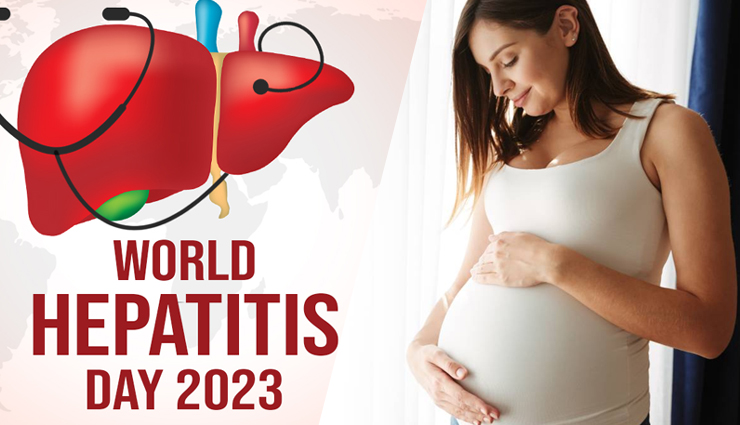- Home›
- Healthy Living›
- World Hepatitis Day 2023: How Does Hepatitis Affect A Pregnant Woman?
World Hepatitis Day 2023: How Does Hepatitis Affect A Pregnant Woman?
By: Priyanka Maheshwari Fri, 28 July 2023 11:55:41

World Hepatitis Day, observed on July 28th, aims to raise awareness about hepatitis and its impact on global health. Among the various types of hepatitis, hepatitis A is a contagious liver infection caused by the hepatitis A virus (HAV). While hepatitis A is generally a mild condition, it can have more severe consequences for certain vulnerable populations, including pregnant women. In this article, we will explore how hepatitis A can affect pregnant women and the importance of prevention and timely medical care.

Understanding Hepatitis A:
Hepatitis A is an infectious liver disease caused by the hepatitis A virus (HAV). It belongs to a group of hepatitis viruses, which includes hepatitis B, C, D, and E. Unlike hepatitis B and C, which can lead to chronic infections, hepatitis A is usually a short-term illness and does not typically cause long-term liver damage. However, it can still result in unpleasant symptoms and complications, especially in certain vulnerable groups.
Mode of Transmission:
Hepatitis A is primarily spread through the fecal-oral route. This means that the virus is present in the feces of an infected person and can be transmitted to others if proper hygiene practices are not followed. Common modes of transmission include:
Consumption of Contaminated Food or Water: Eating food or drinking water that has been contaminated by an infected person can lead to the spread of the virus. Raw or undercooked shellfish, fruits, and vegetables washed with contaminated water are common sources of infection.
Close Contact with an Infected Person: Hepatitis A can be transmitted through close personal contact with someone who is infected. This includes living with or caring for an infected individual, as well as engaging in sexual activities with an infected partner.
Traveling to High-Risk Areas: Traveling to regions with poor sanitation and hygiene practices can increase the risk of hepatitis A transmission.
Symptoms:
The symptoms of hepatitis A can vary from mild to severe and typically manifest within two to six weeks after exposure to the virus. Some individuals, especially young children, may not show any symptoms (asymptomatic) but can still spread the virus to others. Common symptoms of hepatitis A include:
Fatigue and Weakness
Nausea and Vomiting
Loss of Appetite
Abdominal Pain and Discomfort
Jaundice (Yellowing of the Skin and Eyes)
Dark Urine
Pale Stools
Fever
Muscle Pain
While symptoms can persist for several weeks, most people recover fully without experiencing any long-term complications. In rare cases, severe acute liver failure may occur, but this is uncommon.

Impact on Pregnant Women:
During pregnancy, women undergo significant physiological changes to support the growth and development of their unborn child. When a pregnant woman contracts hepatitis A, the virus can have different effects on her compared to non-pregnant individuals. Here are some important considerations:
Increased Risk of Severe Symptoms: Pregnant women with hepatitis A may experience more severe symptoms compared to non-pregnant individuals. The alterations in the immune system during pregnancy can make women more vulnerable to the virus's effects, leading to a higher risk of complications.
Risk of Preterm Birth: Hepatitis A infection during pregnancy has been linked to an increased risk of preterm birth. Premature birth can present health challenges for the newborn and may necessitate specialized medical care.
Impact on the Unborn Child: While hepatitis A does not usually transmit from the mother to the fetus, the mother's health can indirectly affect the baby. If a pregnant woman experiences severe liver inflammation due to hepatitis A, it may impact the baby's growth and development.
It is crucial for pregnant women to take preventive measures to reduce the risk of hepatitis A infection. Practicing good hygiene, including thorough handwashing and avoiding consumption of contaminated food and water, are essential preventive steps. Additionally, vaccination against hepatitis A is highly effective in providing immunity against the virus and protecting both the pregnant woman and her unborn child.
Prevention and Management:
Preventing hepatitis A infection is crucial, especially for pregnant women. Some preventive measures include:
Vaccination: Pregnant women who are at high risk of hepatitis A infection should consult their healthcare provider about the possibility of getting vaccinated. The hepatitis A vaccine is safe for pregnant women and can provide protection against the virus.
Practicing Good Hygiene: Pregnant women should practice good hygiene, including washing hands thoroughly with soap and water after using the restroom, before preparing food, and after changing diapers.
Avoiding High-Risk Foods: Pregnant women should avoid consuming raw or undercooked foods, particularly shellfish and fruits and vegetables that may have been exposed to contaminated water.
Seeking Early Medical Care: If a pregnant woman experiences any symptoms of hepatitis A or suspects exposure to the virus, she should seek immediate medical attention. Early diagnosis and management can help prevent complications and protect the health of both the mother and the baby.





